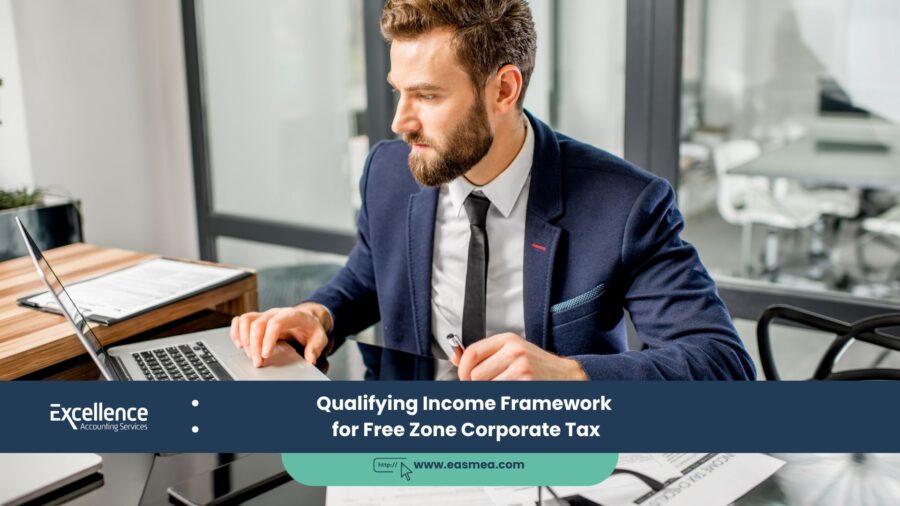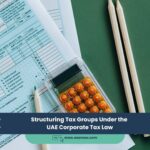Cracking the Code: A Deep Dive into the Qualifying Income Framework for UAE Free Zones Corporate Tax
For decades, UAE Free Zones have been the cornerstone of the nation’s appeal to international investors, offering a tax-free haven for business. The introduction of the UAE Corporate Tax regime preserved this core benefit with a preferential 0% tax rate for Free Zone entities. However, this is where the simplicity ends. The 0% rate is not a blanket exemption; it is a conditional privilege, intricately tied to a complex framework governed by the concept of “Qualifying Income.”
- Cracking the Code: A Deep Dive into the Qualifying Income Framework for UAE Free Zones Corporate Tax
- Step 1: Becoming a Qualifying Free Zone Person (QFZP)
- Step 2: Defining "Qualifying Income" - The Heart of the Matter
- The 'De Minimis' Requirement: The Rule That Can Disqualify Everything
- How Excellence Accounting Services (EAS) Navigates the Framework for You
- Frequently Asked Questions (FAQs) on Qualifying Income
- Secure Your 0% Tax Advantage.
Understanding this framework is not just a matter of compliance—it is fundamental to the financial viability of any business operating within a UAE Free Zone. A misinterpretation of the rules, a failure to segregate income streams, or an inability to meet the stringent substance requirements can lead to the entire income of a Free Zone entity becoming subject to the standard 9% Corporate Tax rate. This is not a minor compliance issue; it’s a strategic risk that could fundamentally alter a company’s profitability.
This in-depth guide is designed to demystify the Qualifying Income framework. We will dissect the criteria for becoming a “Qualifying Free Zone Person,” define the specific types of income that are considered “Qualifying,” and explore the critical ‘de minimis’ rule that can make or break your 0% tax status. This is your essential manual for navigating the new tax landscape and safeguarding your Free Zone advantage.
Key Takeaways
- The 0% Rate is Conditional: It only applies to “Qualifying Income” earned by a “Qualifying Free Zone Person” (QFZP).
- Becoming a QFZP is Step One: You must maintain adequate substance, have audited financials, and meet other criteria to be eligible.
- Qualifying Income is Narrowly Defined: It primarily includes income from other Free Zone entities, exports, and specific “Qualifying Activities.”
- The ‘De Minimis’ Rule is Critical: Earning a small amount of “non-qualifying” revenue is allowed, but exceeding the threshold (5% of total revenue or AED 5 million) can disqualify ALL your income from the 0% rate.
- Substance and Documentation are Non-Negotiable: You must prove your core income-generating activities occur within the Free Zone and maintain meticulous records to segregate income types.
Step 1: Becoming a Qualifying Free Zone Person (QFZP)
Before you can even consider what constitutes Qualifying Income, your business entity must first meet the strict criteria to be classified as a QFZP. This status is the gateway to the 0% tax rate.
The conditions are:
- Maintains Adequate Substance: The entity must have sufficient physical assets, employees, and operations within the Free Zone, proportionate to its activities. This is to prevent the creation of “shell companies” with no real presence. Expert business consultancy can help assess and establish adequate substance.
- Derives Qualifying Income: The entity must earn income that falls under the “Qualifying Income” definition (which we will explore next).
- Has Not Elected to be Subject to Corporate Tax: A QFZP can choose to waive its 0% status and be subject to the standard 9% tax rate.
- Complies with Transfer Pricing Rules: All transactions, especially with Related Parties, must adhere to the arm’s length principle, as outlined in our blog on Corporate Tax pitfalls.
- Prepares Audited Financial Statements: The entity’s annual financial statements must be prepared in accordance with IFRS and audited by an accredited firm. Engaging for professional external audit services is mandatory.
Step 2: Defining “Qualifying Income” – The Heart of the Matter
Once QFZP status is established, the 0% rate applies *only* to its Qualifying Income. Any other income is taxed at 9%. Qualifying Income generally falls into these categories:
1. Income from Transactions with Other Free Zone Persons
This is the most straightforward category. Income derived from providing goods or services to another entity located in any UAE Free Zone is considered Qualifying Income. The logic is to promote business activity within the Free Zone ecosystem.
2. Income from Transactions with a Non-Free Zone Person (Exports)
Income from exporting goods or providing services to a customer outside of the UAE (a Non-Free Zone Person) is also considered Qualifying Income. This aligns with the UAE’s goal of being a global trade and services hub.
3. Income from “Qualifying Activities”
This is a crucial and detailed category. The legislation lists specific business activities that generate Qualifying Income, even when transacted with UAE Mainland companies. These include:
- Manufacturing and processing of goods or materials.
- Holding of shares and other securities for investment purposes.
- Ownership, management, and operation of ships.
- Regulated reinsurance services.
- Fund management services and wealth management services.
- Logistics services (e.g., storage, transportation of goods).
- Financing and leasing of aircraft.
It’s vital to note that any income “attributable” to a domestic or foreign permanent establishment of the QFZP will not be considered Qualifying Income. A proper company formation and structuring strategy is essential to avoid creating unintended taxable presences.
4. Ancillary Income
Any other income is considered Qualifying Income as long as it is “ancillary” or incidental to the main Qualifying Activities listed above. For example, if a manufacturing company (a qualifying activity) earns a small amount of interest income from a bank deposit, that interest could be considered qualifying.
The key distinction is always the nature of the income and the location of the counterparty. Meticulous accounting and bookkeeping is required to segregate these income streams accurately.
The ‘De Minimis’ Requirement: The Rule That Can Disqualify Everything
This is perhaps the most critical and least understood part of the framework. A QFZP is allowed to earn a small amount of “non-qualifying” revenue without tainting its status. This allowance is called the ‘de minimis’ (minimal) requirement.
A QFZP meets the de minimis requirement if its non-qualifying revenue in a tax period does not exceed the lower of:
- 5% of its total revenue for that period, OR
- AED 5,000,000.
If a QFZP fails this test—meaning its non-qualifying revenue exceeds this threshold—then *all* of its income for that tax year (and the subsequent four years) will be disqualified from the 0% rate and will be subject to 9% Corporate Tax.
Example:
- A Free Zone company has total revenue of AED 20,000,000.
- 5% of its total revenue is AED 1,000,000.
- The de minimis threshold is the lower of AED 1,000,000 and AED 5,000,000. So, the threshold is AED 1,000,000.
- If the company’s non-qualifying revenue is AED 900,000, it passes the test, and its Qualifying Income is taxed at 0%.
- If its non-qualifying revenue is AED 1,100,000, it fails the test. Its *entire* taxable income of AED 20,000,000 (after deductions) will be taxed at 9%.
How Excellence Accounting Services (EAS) Navigates the Framework for You
The Qualifying Income framework is complex and requires expert navigation. EAS offers a holistic suite of services to ensure your Free Zone business maintains its 0% tax status.
- Free Zone Corporate Tax Structuring: We provide strategic business consultancy to structure your operations and transactions to maximize Qualifying Income and comply with substance rules.
- Comprehensive Corporate Tax Services: From registration and impact analysis to filing returns, our dedicated UAE Corporate Tax team manages your end-to-end compliance.
- Audit and Assurance: Our mandatory external audit services ensure your financials meet the QFZP requirements. We also offer proactive internal audits to identify compliance gaps.
- Precise Financial Management: We ensure your income streams are meticulously segregated with our expert accounting, reconciliation, and financial reporting services.
- Strategic Financial Oversight: Our CFO services provide the high-level oversight needed to manage complex tax positions and make informed decisions.
Frequently Asked Questions (FAQs) on Qualifying Income
There is no fixed formula, but the FTA expects a QFZP to have a level of operational reality that is appropriate for its business. This means having its own physical office space (not just a flexi-desk if it’s a large operation), an adequate number of qualified full-time employees based in the Free Zone, and incurring sufficient operating expenditure within the Free Zone. Key management decisions should also be made within the UAE. It’s about demonstrating that the Free Zone entity isn’t just a “letterbox company” for tax purposes.
Certainly. Imagine a logistics company in a Free Zone with a total revenue of AED 80 million. Its de minimis threshold is the lower of (5% of 80m = AED 4m) or AED 5m. So, its threshold is AED 4 million. If this company earns AED 4.1 million in revenue from providing local transportation services to an individual on the Mainland (a non-qualifying activity), it has failed the de minimis test. As a result, its entire taxable income for the year will be taxed at 9%.
This is a critical point. Your income from the sale to the Mainland company is generally *not* Qualifying Income. The key factor is your direct counterparty. Since your customer is a Mainland entity, it falls outside the category of “income from another Free Zone Person” or “income from an export.” The subsequent action of your customer does not change the nature of your initial transaction.
This is very common. You must meticulously segregate the revenue and expenses for each activity. The revenue from the qualifying activities can be taxed at 0% (provided you are a QFZP), while the revenue from non-qualifying activities will generate “non-qualifying revenue” which is counted towards your de minimis threshold. If you pass the de minimis test, the profit from the non-qualifying activities is taxed at 9%.
It depends. If the passive income is ancillary to a main qualifying activity (e.g., interest earned on the working capital of a qualifying logistics business), it can be considered Qualifying Income. However, income from holding shares in a mainland company that is not part of a “holding of shares” qualifying activity, or income from mainland real estate, is explicitly excluded and will always be subject to 9% tax.
Generally, no. Income from owning, managing, or developing real estate located in the UAE Mainland is specifically listed as an “Excluded Activity.” This means any rental income or capital gains from such property will be subject to 9% tax and will also count as non-qualifying revenue for the de minimis test.
Yes, absolutely. The law explicitly states that to be a QFZP, an entity must prepare audited financial statements that comply with International Financial Reporting Standards (IFRS). This is a non-negotiable, mandatory requirement. Failure to do so will result in disqualification from the 0% regime.
No. A branch is legally inseparable from its parent company. Since the parent is a Mainland entity subject to 9% tax, its Free Zone branch cannot be considered a QFZP and will also be subject to the standard 9% Corporate Tax rate.
You need a complete and clear audit trail. This includes: 1) Sales invoices clearly identifying the customer’s name and location (to prove if they are in a Free Zone, Mainland, or overseas). 2) Contracts and service agreements detailing the scope of work (to prove it’s a qualifying activity). 3) For goods, full shipping documentation like bills of lading and customs declarations (to prove export). 4) A detailed general ledger that segregates income streams.
Not forever, but for a significant period. If you fail the test in one tax period, you lose your QFZP status for that period and the subsequent four tax periods. This means you will be subject to 9% tax on all your income for a total of five years. After this period, you may be able to re-qualify as a QFZP if you meet all the conditions again.
Conclusion: A Privilege That Demands Precision
The UAE’s 0% Free Zone Corporate Tax rate remains a powerful incentive for businesses. However, it is a privilege earned through meticulous compliance, not a right granted by a trade license. The Qualifying Income framework, with its detailed definitions and strict thresholds, demands a proactive and strategic approach to tax planning and financial management. Businesses that invest in understanding these rules, structuring their affairs correctly, and maintaining impeccable records will be the ones who continue to thrive in this new era of financial transparency.




